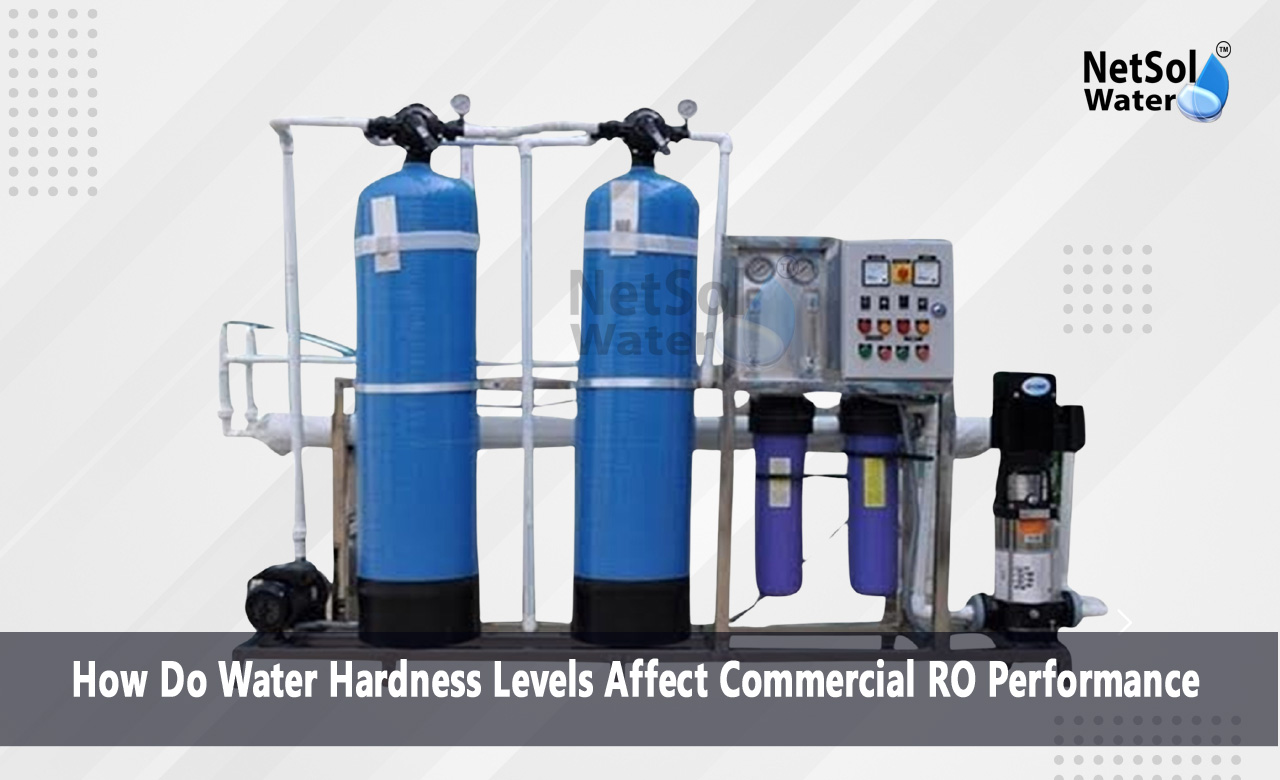How Do Water Hardness Levels Affect Commercial RO Performance?
Water quality is usually very important for most businesses and industries. Manufacturing, cleaning and cooling require food processors to rely on clean water. That is the reason Commercial RO Plants are so widely used—they are able to clean water by removing impurities. However, many users might not realize that hard water can reduce the effectiveness of an RO system. Here, we will explain how water hardness levels affect commercial RO performance and why businesses must focus on this.
What does Hard Water mean?
Let us begin this topic by learning what hard water is. One of the main minerals found in hard water is calcium and magnesium is the second most frequently found. They come from rocks and soil when water travels over them. Even though drinking hard water is not harmful, it can be bad for many water-related systems.
If you have noticed spots on your cutlery or scale on tap water, it is probably caused by hard water. Using such water in an RO plant can cause the machine to operate less efficiently and its life to be cut short.
Read: Commercial RO Plant Manufacturers
How Water Hardness Impacts RO Systems?
Let us now see how water hardness levels affect commercial RO performance in practical terms.
Scaling of RO Membranes
Scale is one of the largest issues with hard water. The magnesium and calcium in hard water have a tendency to accumulate on the surface of the RO membrane over time. This scaling hinders the ability of the membrane to pass clean water, decreasing the overall efficiency of the system.
The RO plant is centered on the membrane. When scale blocks the plumbing, the system must try harder and consume more electricity, wearing it out quickly.
Higher Maintenance Costs
When scaling occurs often, it results in frequent cleaning and maintenance. Sometimes the membranes even require premature replacement. Not only this incurs extra expense, but also generates downtime, impacting business performance. So, water hardness levels clearly influence commercial RO performance by increasing maintenance requirements and decreasing productivity.
Lower Water Recovery Rate
Hard water decreases the volume of clean water the system can be recovered. Because the membrane is clogged up by minerals, smaller amounts of water get through, and greater amounts of water get rejected as waste. This results in the system becoming less effective and requiring more water to generate the same quantity of output.
Effect on Energy Consumption
An RO plant that has to struggle with hard water has to force water through plugged membranes, which means more energy consumption. With time, this can result in greater electricity bills. For business units where every penny matters in energy saving, hard water can quietly nibble into profits.
How to Control Water Hardness for Commercial RO Systems?
To keep your RO plant working properly, it’s important to take steps that reduce the effects of hard water. Here are some ways to manage it:
Use Water Softeners: Installing a water softener before the RO plant can remove calcium and magnesium from water. This prevents scaling and helps the RO plant perform better. It is one of the most common solutions used in industries.
Pre-Treatment with Anti-Scalants: Anti-scalant chemicals may be added to water prior to its entry into the RO plant. These chemicals inhibit the hard minerals from creating scale on the membrane. This is sometimes utilized in conjunction with other treatments.
Periodic Monitoring: Regular monitoring of water quality and membrane operation identifies hardness issues early. Monitoring pressure and flow rates can inform you when maintenance is required.
Periodic Cleaning of Membrane: Planned membrane cleaning via authorized means removes minor scaling and prevents the system from slowing down. This maintains a longer lifespan for the membranes.
Why This Knowledge Matters for Your Business?
Understanding howwater hardness levels affect commercial RO performancecan help you choose wise solutions. After you become aware of the risks of hard water, selecting the correct systems and steps for maintenance will be easier. It improves the water quality, cuts down time when the system is shut down and saves expense.
Overlooking water hardness when pure water is central to your industry can cause harm to your business. On the other hand, strong handling of hardness helps your RO plant work better and longer, improving your earnings from the investment.
Conclusion
It'squite obvious that water hardness levels affect commercial RO performance in numerous aspects. From membrane scaling and higher maintenance costs to higher energy consumption and reduced water recovery, hard water can wreak havoc on RO plants. Fortunately, with the proper measures—such as utilizing softeners, incorporating anti-scalants, and keeping an eye on your system—you can control the issue and maintain your RO plant operating smoothly.
Whether you have a hotel, factory, or school, knowing how water hardness levels impact commercial RO performance will ensure you safeguard your investment and enjoy dependable, clean water every day. Plan ahead, act smart, and make your RO plant perform at its best.
Do you need an advice or assistance on selecting the best water and waste water treatment unit? We have solutions for all your problems!
Let us know your problem, our experts will make sure that it goes away.
For an assistance or related query,
Call on +91-9650608473 Or write us at enquiry@netsolwater.com



